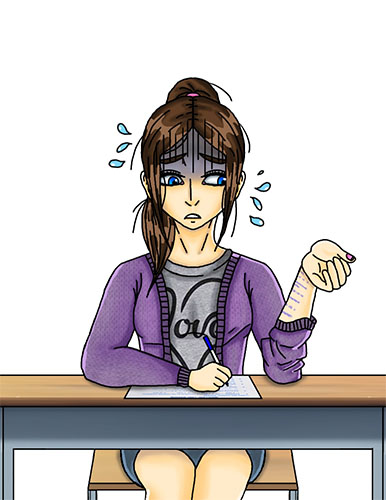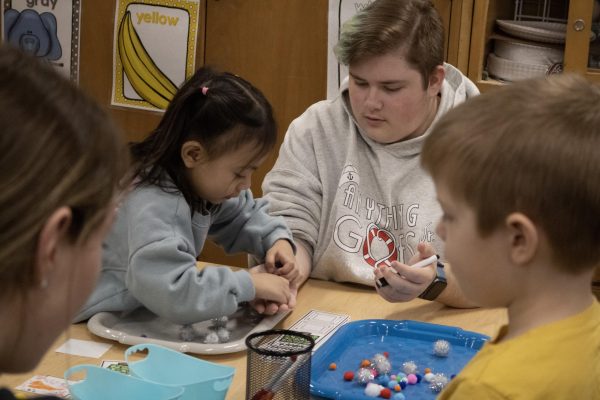Academic Honesty and Integrity Policy challenged; student cheating becomes normalized
October 4, 2019
After marching in the West Lot until after dusk, junior Lily Paterno* went home to AP Calculus problems, unstarted Physics Web- Assigns, AP Language readings, and a never ending stream of AP US History notes. She attempted to start her work, but was too tired both physically and mentally, and instead of being awake crying, she fell asleep. Her alarm went off at 4 a.m., and she tiptoed downstairs to make herself a cup of tea before continuing her piles of homework from last night.
Although Paterno always puts in the time necessary to do well in her courses, she said that many of her peers who have a similar workload feel pressured to keep up with other academically competitive students, and resort to cheating when they feel underprepared.
“The system of education we are in is a merit system,” Paterno said. “When there are so many people around the country and at our school that do so well, then people are pressured to do well and keep their good GPA. Sometimes one test or quiz can make or break your grade, and when the pressure is on you, you might do anything to keep your grade.”
Unlike Paterno, junior Grace Moore* claimed that she has other, more important things to attend to than to stay up doing school work all night. Moore is aware that many perceive cheating as wrong, but she does so anyway due to her fear of failure, as do many students. An unscientific anonymous Oracle conducted survey found that out of 326 students, 42 percent admitted to cheating on a test or assignment. She explained that she feels the amount of cheating at South is a direct reflection of issues within the education system.
“I think if your students are so terrified of failing that they would go as far as to cheat and give someone else’s knowledge as their own, [then] that’s a problem with the education system, and that’s something that needs to be fixed,” Moore said. “If they really didn’t want us to [cheat], there would be more precaution in helping us to not cheat.”
South Social Worker David Hartman stated that students cheat due to a combination of feeling pressure to succeed, fear of failure and not wanting to disappoint parents and teachers. He said there is no way to encourage students to avoid cheating, but there are strategies that students can use to avoid the feelings of anxiety, stress and underpreparedness that leads to cheating.
“It is better to fail a test, with truthfulness and authenticity, and to feel powerful in the little battles,” Hartman said. “Telling one’s self [that they] can handle it… leads to feeling strong and higher self-esteem. Telling one’s self that [they can’t handle it] leads to avoidance, anxiety, stress and sadness.”
Ronald Bean, assistant principal and dean of students, stated that there is an Academic Honesty and Integrity Policy presented to students every year. All academic honesty offenses made against students are cumulative, and there is a continuous record kept. These infractions are stored in a temporary discipline file separate from a student’s permanent file, are not shared with colleges, universities or employers, and are destroyed five years after the student graduates, Bean said.
“[The most common cases of academic dishonesty are] people either not citing or taking credit for words that aren’t their own,” Bean said. “[For example,] writing papers and copying things from the internet and not properly citing them. [Also,] cheating on tests, getting answers from friends and then getting questions from friends before they take the test.”
The first offense of academic dishonesty results in the student receiving a zero on the assignment, and the subsequent offense would also have that consequence in addition to a Saturday detention, according to Bean. If incidents of academic dishonesty continue, the student could be dropped from the class with a permanent Withdrawn Failing (WF) on their transcript and, in rare cases, expelled from school. Bean said he believes that academic dishonesty policy does not deter students from cheating; it is the individual student’s moral compass that guides them.
“Unfortunately, some people are just going to make poor choices no matter what we put in place,” Bean said. “I don’t think consequences or the threat or fear of consequences forces people to make better choices. People make good choices because it’s the right thing to do.”
Paterno claimed that cheating can affect more people than just the cheater. By cheating, the student’s score is not truly representative of their own work. Without the knowledge of this, the teacher believes that the student understands the material, and that high scores can be obtained, according to Paterno. However, this affects Paterno when the teacher does not believe a curve is necessary due to the inflated scores of people who cheat.
“In my math class, there was a group of people in the corner of the room, about four or five people, and on almost every single test they cheated off of each other,” Paterno said. “They all got really good scores on the tests, and sometimes the rest of us in the class didn’t do as well, but the teacher wouldn’t curve it because some people in the class got really high scores, which showed it was possible, but those people were getting them artificially.”
Jeff Rylander, instructional supervisor of the Science Department, said that cheating is not a new concept to him. Seven to eight years ago, according to Rylander, there were multiple students cheating on online assignments through the online resources the science department provided.
“Particularly in WebAssign, some students had gotten the I.D.s of friends and had logged in as [them] and used some of those answers as their own,” Rylander said. “So they had logged in as someone else and impersonated another person basically.”
Cameron Muir, associate principal for curriculum and instruction, said that cases of plagiarism have increased over the years due to either student behavior or the development of technology to detect plagiarism. Muir said that new technology, such as the Apple Watch, can increase the number of avenues that students can use to cheat. The internal debate to plagiarize or cheat is represented by risk/reward, Muir explained.
“When there is a question about right or wrong, there’s a risk/reward fight…that goes on in people’s minds,” Muir said. “Is the grade so important that this particular instance of an assessment or paper is going to outweigh the risk of being caught?”
To cheat, Moore said that she writes answers on her desk and hides them with her paper, talks to friends about answers, peeks at other people’s papers during an assessment and one time wrote two paragraphs on a piece of paper and hid it in her sleeve. She explained that she only cheats on subjects she is not interested in because she does not feel the need to learn the information if she never wants to use it again.
“I don’t [feel like I’m cheating myself out of an education] because the things I cheat on are things I don’t care about,” Moore said. “I would never cheat on something English related and I don’t think I ever have because English is one of my favorite classes, it means a lot to me.”
Moore said that she believes that her cheating habits could potentially become routine. Bean said that the more students cheat and get away with it, the easier it becomes for them to morally justify it.
“You are taking credit for work that is not your own,” Bean said. “The more comfortable you become with that, the easier it is to do it and the more excuses you make in terms of validating why it’s ok that I cheated, so it becomes a pattern.”
In agreement with Bean, Moore said she had issues with her conscience when she started cheating, but now as it has become such a mindless routine, she does not feel remorse like she used to.
“I [used to feel guilty] at first, but now it’s become so normal for me that it just is what it is,” Moore said.
The pressure to do well in school is self-imposed, according to Moore. The lack of guilt over cheating she has felt is partly due to influences around her who dismiss cheating as an important offense, such as her mother.
“My mom always tells stories about how much she cheated in school as a joke, but she also says to not do that and that it’s bad,” Moore said. “If she found out, I don’t think she would be fuming.”
Senior Josh Avery*, who has also cheated, stated that his parents would not be as lenient if he ever got caught cheating on a test. He was taught not to take the wrong path even if it was easier than the correct one. He stated he does so anyway because he cheats on smaller parts of tests such as vocabulary for his world language class and multiple choice questions in math class.
“[My parents would be more] disappointed in me if they knew I cheated on a test than bad grades because they were raised to do the right thing even if the outcome is bad,” Avery said.
Rylander said he believes that failing would be better than cheating because of his Christian beliefs. He explained that ultimately students who cheat will continue to do so until they eventually get caught in high school, college, or life.
“I speak of it from maybe a different perspective from some, but as a Christian, I feel like there [are] clear commands in the Bible that speak to [cheating] being wrong,” Rylander said. “I believe that there are some things that are absolute. There are absolute rights and wrongs and I believe [cheating] is an absolute wrong.”
Rylander, in an attempt to prevent cheating, said he cites the academic dishonesty policy to prevent students from claiming ignorance to rules.
“I think some students do [take academic honesty] seriously but I would be foolish to think that students are not being dishonest,” Rylander said. “But that being said, I think it is very important that we communicate our expectations first of all. And I think the academic dishonesty policy is one vehicle to do that.”
Other students, such as Moore and Avery, cite teachers using dividers, reorganizing desks, and even go as far as creating multiple versions of tests to prevent cheating. According to Moore, she is not discouraged by these tactics, rather, she stated that her life was only made slightly more difficult by them. Rylander expressed disappointment in students who choose to cheat, claiming that it will one day become a dishonest lifestyle.
“I believe that [students] are going to get caught if they continue to [cheat],” Rylander said. “The challenge is that the stakes get higher and higher as [they] go further and further. If a student doesn’t get caught cheating on a quiz, then they’ll do it on a test, and if they don’t get caught on the test, then maybe they’ll do it in college on an exam. If they don’t get caught there, maybe they’ll do it on their taxes.”
*Names have been changed














